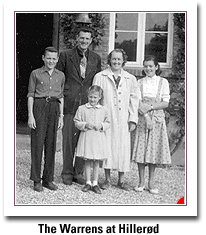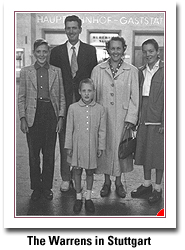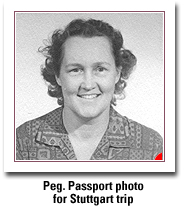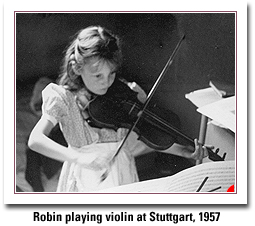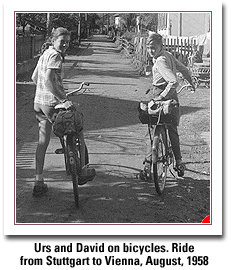|
Stuttgart
That was Peg for you - always alert, and always creative with the children. While in Denmark, we became enthusiastic about the beautiful knitted sweaters worn by many Danish people. So Peg bought a supply of skeins of various colors of wool and a set of instructions for knitting sweaters. Trouble was, the only knitting instructions available for knitting these sweaters were in Danish. Had they been in Dutch, it would have constituted no problem, for Peg had had to acquire a reading knowledge of Dutch while at Heidelberg as part of an assigned major analysis of a Rembrandt painting. She announced to her Professor that she was facing difficulties, since so many of the books on Rembrandt were in Dutch. "So, learn Dutch!" growled her professor. But now, this Danish was not so close to German as was Dutch, so Peg had real difficulty in deciphering the Danish knitting instructions for these rather elaborate sweaters. Never mind. She did it, and she eventually completed five such sweaters, one for each member of our family.
(It is things like that, some big, some little, that I think of now as I sit by her bedside. I have typed the above little by little, day by day. I do not type at her bedside, but this is where I reminisce and bring these events up in my memory, night after night. That is why I refer to sitting now at her bedside gazing at this wonderful woman in bed before me, now sleeping soundly.) One of the participants at Hillerød was a Hindu from India by the name of Swamimalai Srinivasan. Some time later, he came all the way from Göttingen to Stuttgart to be with us for a few days. Peg kept a guest book, and Swami, as we called him, wrote the following: "Although Stuttgart greeted me with the ubiquitous downpour, I felt the warm welcome of the Warrens. Not without reason I made [their home] as my headquarters. Surely enough this is my home and I part of them. I largely wait for the day to greet them in India in my home with rose petals.... Happy memories and many sweet rejoicings." On another occasion, he arrived with a friend when I was not there. The U. S. Information Service had arranged a weekend conference of mayors, county officials, and other civic leaders in Southwest Germany, and I was one of the four professors who were the principal speakers, the other three being Germans. Incidentally, this was my first major speech in German. I was picked up by an imposing limousine and chauffeur from the American Consulate. I was also delivered home after the conference along with another American professor who had attended, and with two stenographers from the Consulate. It had created quite a stir in the neighborhood when I was picked up by the big limousine, but when I was brought back it was quite obvious to the neighbors that there were two attractive blond women in the car. I went upstairs and rejoiced to find that Swamimalai and another Indian friend, the secretary of the German-Indian Society, had come and visited with Peg for a few minutes not too long after I had left for the conference. Frau Hamp, our downstairs neighbor, put it this way, as I greeted her on my way upstairs: "What's the world coming to? Here I see the Herr Professor getting back from a weekend and saying goodbye to a beautiful blonde. But what you don't know is that no sooner did you get out of town than two handsome Indians came to visit the Frau Professor!" One day as I came out of the City Hall, I ran into Johannes Gaul, a lanky man of about thirty-five who had once visited the Quaker Meeting in Stuttgart. He told me despondently that he was about to do away with himself. Taken aback at this unparalleled conversation opener, I stayed talking with him for an hour and invited him to dinner at our house that evening. Johannes was brain damaged, having been hit over the head in a Nazi concentration camp. He was very nice but very erratic. He came to dinner that night - and stayed with us for the next two weeks. All the children were with us, so we didn't have much room for him. He slept on the settee in the living room. Damaged as he was, he had horrible nightmares, and would turn and churn in his sleep. In the daytime, he was fine, though somewhat compulsive in his ideas. As luck would have it, Peg and I had just purchased tickets for a series of concerts in the Stuttgart Liederhalle. But we could not dare to leave the children while Johannes Gaul was there. As a result, Peg and I took turns staying home, each of us taking one of the children along to the concerts using the second ticket. The whole episode was quite a challenge for Peg, with three children in school and Johannes on the couch and me continuing interviewing local officials for my research. Johannes earned his living as a copy reader. He was self-educated, and in addition to his native German, he knew some English and some French. At one evening meal, he raised his wine glass and proclaimed: "To your sanity!" - not a good translation of the widely known French toast. Before returning from Europe to Alfred, we were asked to take responsibility for an international student seminar in Vienna, Austria, with Peg once again hostess. Among other things, she arranged for a group of the participants to go into Vienna and hear a seldom produced opera by Haydn, Das Leben auf dem Mond, Life on the Moon.
"The Rektor (corresponding to our university president) was making some announcement or other as we sat there in relaxed fashion: 'And now it is my special privilege to acknowledge the presence of an American professor...' We pricked up our ears. ' who is here in the orchestra with his family, giving us all a true example of Artes liberales." Someone handed him a large bouquet, and suddenly, there he was, presenting it to my wife, who up to this point had been relaxing in what she thought was perfect anonymity. Next, he turned to me with a package that later turned out to be a box of chocolates. He followed up by singling out the two children and giving them each a small gift. The Commencement, held in the evening, was followed by a reception and a joyful dance evening."
Later, in Alfred, the four of us duplicated the event, playing in the university orchestra's rendition of The Messiah two years in a row, but without the fanfare and gifts. Whenever we were in Europe, we made it a habit of traveling and camping during vacations. In one such vacation trip or another we camped in just about all the countries from Denmark to Yugoslavia. We camped in tents in the early days, but now that we had a Volkswagen bus, Peg slept on the front seat with Robin in back, while Ursula, David, and I slept in the tents. Continue with Yugoslavia |
